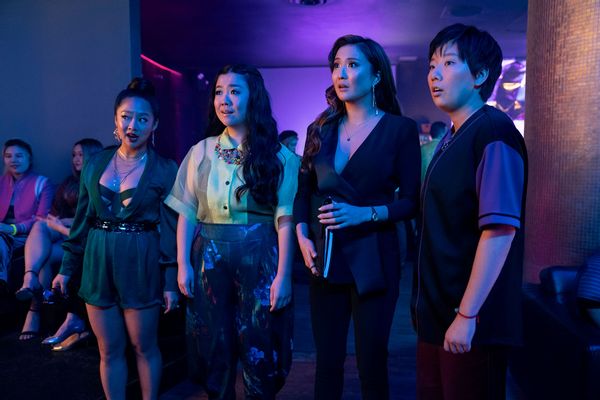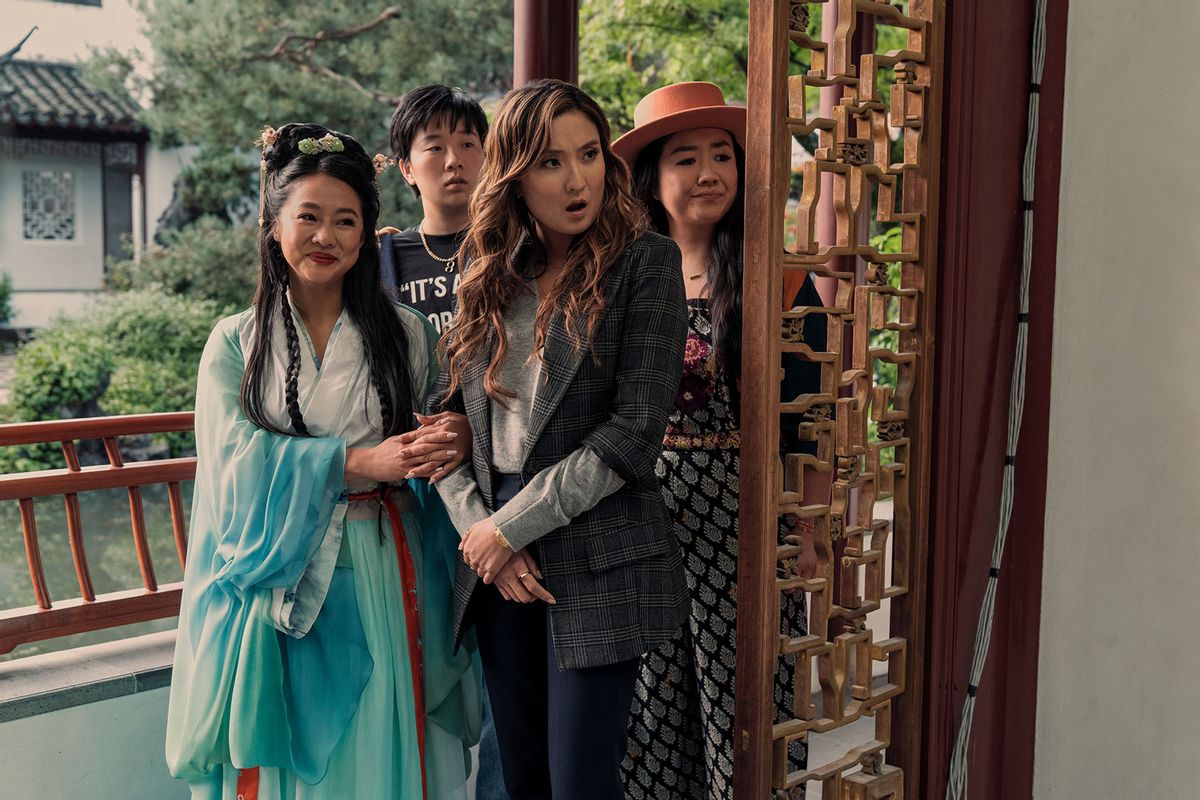If the road trip movie tends to literalize a traditional and familiar narrative structure — taking its merry band of characters from Point A to Point B — you could argue that "Joy Ride's" contribution to the genre is, beyond being a near expert (if not wholly surprising) execution of its archetype, gently prodding the limits of that kind of movie.
"Joy Ride" is shiny and looks fresh, certainly amplified by the impressive performances from the ensemble.
Yes, "Joy Ride" is a breezy, delightful movie with an impressive joke density (thanks to a screenplay by Cherry Chevapravatdumrong and Teresa Hsiao); yes, it's about friendship; yes, it aces the "specificity in story underlines universality in theme" test; yes, it lets its Asian men be sexy; yes, it addresses internalized racism; yes, it takes pride in sticking its tongue out at a kind of Asian (American) respectability politics and lets its ensemble "be messy," as is so desirable in our various forms of representation discourse. But perhaps more compellingly, "Joy Ride" functions as an interesting example of Asian American cinema by its light toying with the nature of identity.
There have been other movies, and ones in the road trip lineage, that have had their way with the self: "My Own Private Idaho," "To Wong Foo, Thanks for Everything! Julie Newmar" and "Two for the Road" among them. But "Joy Ride's" premise rests fairly explicitly on the idea of finding yourself: though ambitious lawyer Audrey (Ashley Park of "Emily in Paris") is going to Beijing for a work trip with the promise of making partner at her all-white bro firm, another incentive lies before her. She could find her birth mother. Audrey was adopted to white parents, leaving her to be the only Asian girl in the town of White Hills, besides her best friend, slacker sex positive artist, Lolo (Sherry Cola, "Good Trouble"). And on their journey they are joined by Lolo's cousin Deadeye (Sabrina Wu) and Audrey's other best friend, successful actress Kat (Stephanie Hsu, "Everything Everywhere All at Once"). Hijinks ensue.
Adele Lim, who worked as a screenwriter on "Crazy Rich Asians" and "Raya and the Last Dragon," takes her feature film directorial debut by the hilt and, with editor Nena Erb, focuses on making sure that every setup, premise and absurdist gag is as tight as possible. It makes "Joy Ride's" pace feel self-assured and the relationships between the characters dynamic, even if its insights into emotional displacement occasionally feel trimmed of welcome fat.
But Lim has a good sense of space, both in terms of the actual environments she's using, from Beijing to Seoul, from an airport walkway to a smaller, cramped home, feel textured and lived in, not only for the characters, but also for the sharpening of a joke. "Joy Ride" is shiny and looks fresh, certainly amplified by the impressive performances from the ensemble. And while its more directly provocative gags are delivered with gusto (props particularly to Sherry Cola and Stephanie Hsu, whose chillness and movie-star high maintenance, respectively, clash with delight), the deadpan buttons from Sabrina Wu, who flexes their ability to vacillate from blank to deeply emotional, are a thrilling, hilarious jolt.
"Joy Ride" is hardly the first film to drive down the path of "child of adoption seeks birth parents" — such narratives may, in fact, dominate movies about adoption period, from Lion to "Philomena." There's a preponderance of stories emphatically implying that to find one's biological family is to unlock all the secrets of one's identity. And it's something that feels like "Joy Ride" is also going to run with, particularly when Ronny Chieng's slick and powerful potential business partner character asks Audrey during a business drinking session, "If you do not know where you come from, how do you know who you are?" It is, frankly, a boring, essentialist point of view.
 Stephanie Hsu as Kat, Sherry Cola as Lolo, Ashley Park as Audrey and Sabrina Wu as Deadeye in "Joy Ride" (Ed Araquel/Lionsgate)But there's a whiff of self-awareness about the banality of that type of questioning. The scene is bookended by puke and social/professional humiliation, as the extremely Americanized Audrey struggles to keep down Thousand Year Egg shots, nevermind her guilt about being unable to adequately assimilate into Chinese culture. That Audrey is bluntly presented as a child of cross-racial adoption adds a clever element that reconfigures the movie's approach to identity, especially in a genre where transformation is a key component to a narrative's catharsis and success. How can a character be transformed into something easily legible, or simply boxed in when their concept of selfhood is already, for lack of a better word, problematized by the friction between race, culture and society?
Stephanie Hsu as Kat, Sherry Cola as Lolo, Ashley Park as Audrey and Sabrina Wu as Deadeye in "Joy Ride" (Ed Araquel/Lionsgate)But there's a whiff of self-awareness about the banality of that type of questioning. The scene is bookended by puke and social/professional humiliation, as the extremely Americanized Audrey struggles to keep down Thousand Year Egg shots, nevermind her guilt about being unable to adequately assimilate into Chinese culture. That Audrey is bluntly presented as a child of cross-racial adoption adds a clever element that reconfigures the movie's approach to identity, especially in a genre where transformation is a key component to a narrative's catharsis and success. How can a character be transformed into something easily legible, or simply boxed in when their concept of selfhood is already, for lack of a better word, problematized by the friction between race, culture and society?
What is worthwhile about its approach, however, is that "Joy Ride" subverts and expands expectations of closure.
Lolo and Deadeye sneak some jabs in about Audrey being "basically white" (she loves The National and can name every character on "Succession"), and the film nods to the frustrating liminal space that cross-racial adoptees can feel like they occupy: clearly not white, but also seen as not Asian enough. It would have been nice to see how that uncertainty and those feelings of alienation shaped Audrey's life not on this trip, besides the overachieving as her desire to prove herself to an unwelcome society, as well as the pitfalls of raising/being raised as a child from a different racial and cultural background, but the film compensates for that by having Audrey repeat through dialogue her feelings of displacement. But "Joy Ride" still manages to take Audrey's state of flux seriously and does so with sensitivity.
What is worthwhile about its approach, however, is that "Joy Ride" (without spoiling) subverts and expands expectations of closure. It is a neat movie, many of its ends tied up with a ribbon; but not all of them so neatly that these characters are radically transformed in the way that they might be in another kind of road trip movie. The characters are perhaps better versions of themselves, more honest and caring. But their maturation is less rooted in the essentialist DNA that tends to be embedded within these movies — that their journey to something will have fundamentally changed who they are — and more in refining and polishing who these characters were the whole time.
Want a daily wrap-up of all the news and commentary Salon has to offer? Subscribe to our morning newsletter, Crash Course.
Perhaps the film could have leaned more into being headier, more emotional, have more going on. But it's got diamond-cut jokes and it sticks the emotional landing, leaving just enough space for Audrey to rethink how she relates to her identity, not merely on a scale of the "enoughness" of her Asianness. "Joy Ride's" sense of Asian Americanness is liberal and broad (not in a bad way, exactly), embracing a kind of smudgy, melted idea of culture, heritage and identity, strengthened by the community of loved ones, a kind of pan-Asian American camaraderie.
With its own idiosyncratic sense of humor (that is electrified by the star wattage from its ensemble) that is purely uninterested in being compared to its other white gross-out comedy counterparts, "Joy Ride" cleverly embodies its primary thematic occupations: being the best version of its type. It's the perfect trip for the summer.
"Joy Ride" opens nationwide Friday, July 7.



Shares